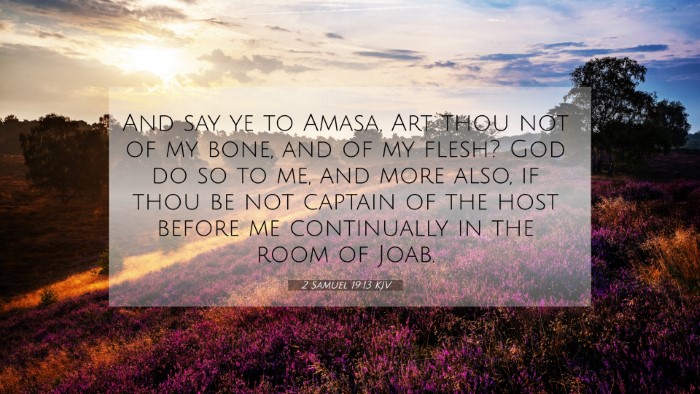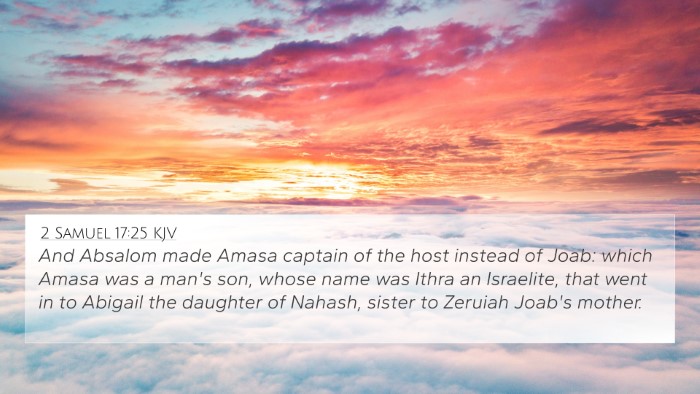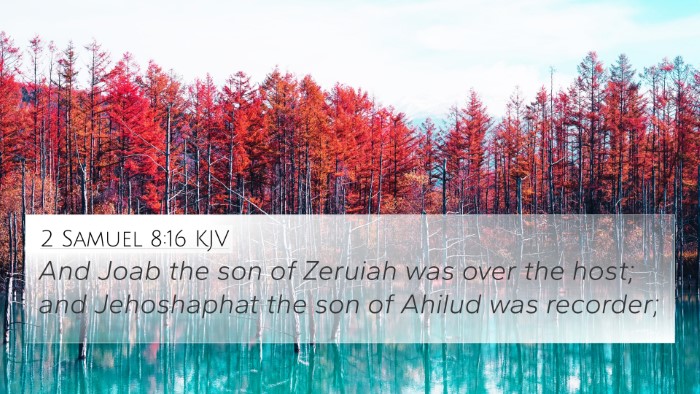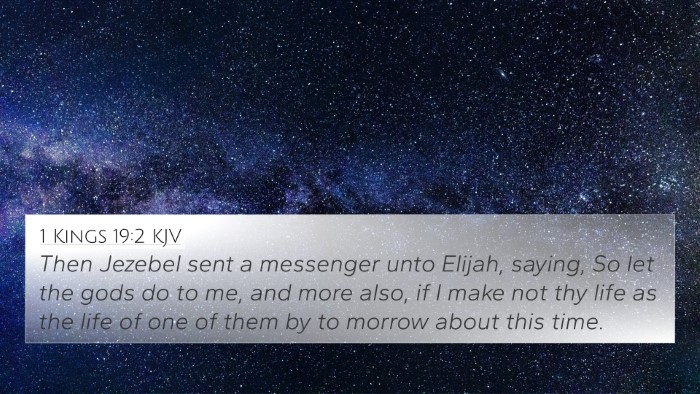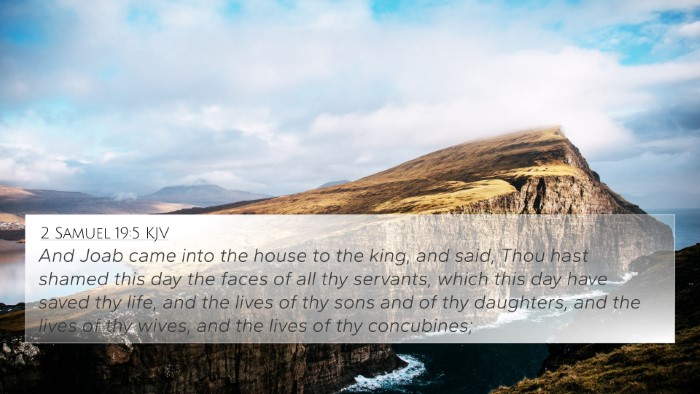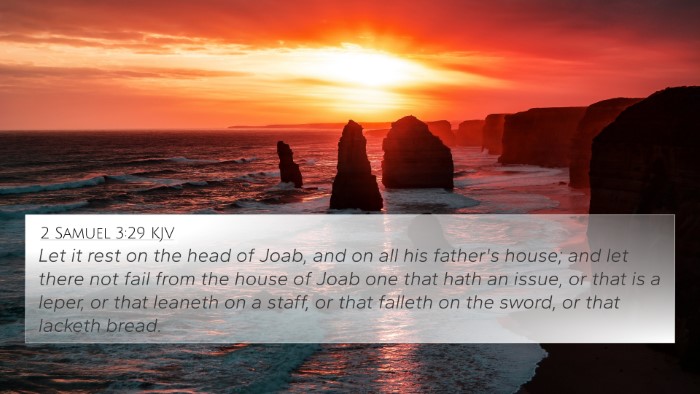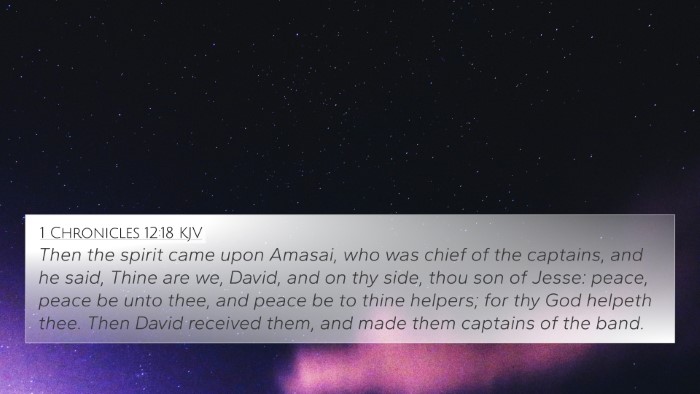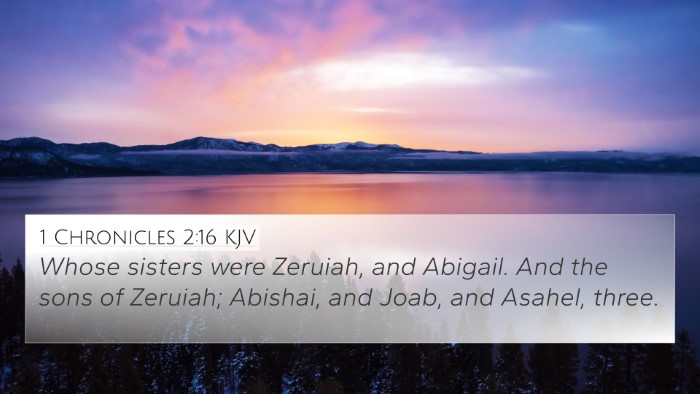Understanding 2 Samuel 19:13
2 Samuel 19:13 states: "And say ye to Amasa, Art thou not of my bone, and of my flesh? God do so to me, and more also, if thou be not captain of the host before me continually in the room of Joab."
This verse demonstrates King David's intention to consolidate his power and establish loyalty, particularly amid the ongoing internal strife following Absalom's rebellion. The call to Amasa highlights David's desire for unity and reconciliation within his ranks.
Commentary Insights
-
Matthew Henry Commentary:
Henry emphasizes that David's decision to appoint Amasa instead of Joab was a significant political move aimed at healing the rift created by Absalom's rebellion. David seeks to promote loyalty among his followers by appealing to kinship, as Amasa was related to him and thus a fitting choice to bridge loyalties.
-
Albert Barnes Commentary:
Barnes notes that David's urgent message to Amasa is filled with familial language, reinforcing the covenant of loyalty and allegiance. By invoking the covenantal relationship, David hopes to secure Amasa's allegiance, given the context of his recent conflict.
-
Adam Clarke Commentary:
Clarke interprets this verse as an indication of David's strategic alliance-building. By promoting Amasa, who had previously led the rebels, David aims to unify the people after discord. Clarke highlights that David's approach reflects wisdom in leadership amid turmoil.
Biblical Cross-References
This verse can be cross-referenced with several significant passages that reveal the interconnected themes of loyalty, leadership, and reconciliation. Here are notable verses that relate to 2 Samuel 19:13:
- 1 Samuel 18:1-3: This passage discusses the bond between David and Jonathan, revealing the essence of loyalty.
- 2 Samuel 3:12-21: Amasa's earlier role and ties to both David and the rebellion can be explored here.
- 2 Samuel 20:4: A direct continuation of Amasa's appointment and his ensuing role is pivotal for understanding the context.
- 1 Chronicles 12:16-22: Details the unifying efforts of tribal leaders, similar to David’s actions with Amasa.
- Romans 12:10: This New Testament epistle contains themes of brotherly love that resonate with David's familial appeal.
- Ephesians 4:3: The call for unity among believers mirrors David's aim for unity among his forces.
- Luke 14:31-32: Reflects upon calculated decisions in leadership that apply to David's context.
Thematic Connections and Analysis
The verse serves as a rich ground for thematic exploration, including:
-
Leadership and Loyalty: David’s choice reflects the significant role of both qualities in governance.
-
Reconciliation: The emphasis on family ties speaks to the importance of mending relationships after conflict.
-
Covenant Relationships: The invocation of kinship illustrates God’s faithfulness and our responses to it in relationships.
Using Bible Cross-References Effectively
Understanding biblical texts through cross-references can enhance your study of the Scripture. Here are some tools and methods to facilitate this:
- Bible Concordance: Enables quick location of verses across different contexts.
- Bible Cross-Reference Guide: Provides thematic connections and helps in navigating relational scriptures.
- Cross-Reference Bible Study: Utilizes links between passages to deepen your understanding of themes and teachings.
- Identifying Inter-Biblical Themes: Helps interpret connections between the Old Testament context of David's reign and relevant New Testament teachings.
Conclusion
2 Samuel 19:13 is not just a simple directive from David but a profound statement that reflects the complexities of leadership, loyalty, and reconciliation within the narrative of Israel’s monarchy. By exploring cross-references and thematic connections, one can uncover deeper meanings and applies these lessons into modern contexts. The inter-Biblical dialogue provides a pathway for understanding God's unchanging nature and our role within His divine narrative.


